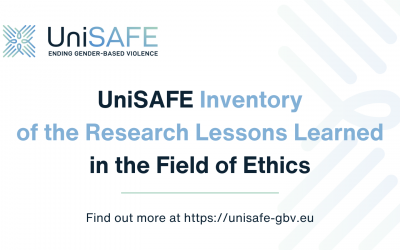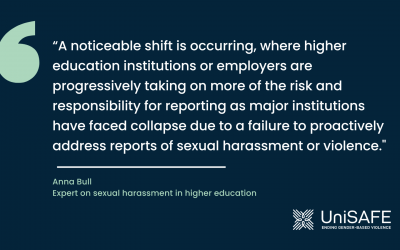Gender-based violence in universities and research organisations is a persistent, yet under-researched and under-reported phenomenon. UniSAFE is an ambitious three-year project that aims to gather extensive data on multiple forms of gender-based violence to fill the existing gaps in research and implementation, thereby contributing to eradicating the issue from universities and research organisations. The first public deliverable of the project is the newly published report on the conceptual and theoretical state of the art, an extensive review of quantitative and qualitative studies, macro data, and a presentation of the conceptual framework that will inform the design of research instruments.
Theorising gender and gender-based violence
The definition of gender and gender-based violence varies in different contexts and epistemological approaches, and different understandings may raise conflicts. UniSAFE is informed by a feminist account of both gender and violence and conceptualises gender as a social construct, a process, and intersectional. This understanding allows us to go beyond a binary definition of gender and include the experiences of women, men, and further genders in our study.
Gender-based violence is conceptualised as a human rights violation and observed from an intersectional perspective. Our definition of gender-based violence encompasses many and different forms of online and offline violence, violations and abuse, and gender harassment and sexual harassment. Gender-based violence is also deeply intertwined with other forms of inequalities.
An ambitious and holistic framework of analysis
UniSAFE relies on an ambitious comparative multi-level research design and a holistic analytical model to develop the necessary knowledge to combat and eradicate gender-based violence.
One main focus of the project will be on collecting empirical evidence of the prevalence of gender-based violence in 45 research performing organisations, understanding how this relates to its determinants and consequences. The study will also be looking into how prevalence responds to the roles of university and research organisations in preventing, protecting, prosecuting, providing services supported by policies and partnership. Each of these mechanisms will be investigated on national, organisational and individual levels.
The conceptual model at the core of the UniSAFE project is thus genuinely holistic, integrating insight gathered from individuals, organisations, policies, regional and national legal frameworks to understand the prevalence of gender-based violence.
A valuable contribution to research and policymaking
The ambitious research design and scope enable UniSAFE to significantly contribute to the existing knowledge on gender-based violence.
Compared to the existing research, UniSAFE will gather extensive data on a broader range of forms of violence, including the prevalence of economic, organisational and online violence in research performing organisations. The study will have a greater focus on understanding who the perpetrators of violence are, and on bystanders’ experience.
Thanks to its innovative research design and its strong multi and interdisciplinary consortium, UniSAFE truly has the potential to empower policymakers to design effective policies and increase awareness and capacity among students and staff, making its contribution towards eradicating the issue in academia and research workplaces in Europe.



